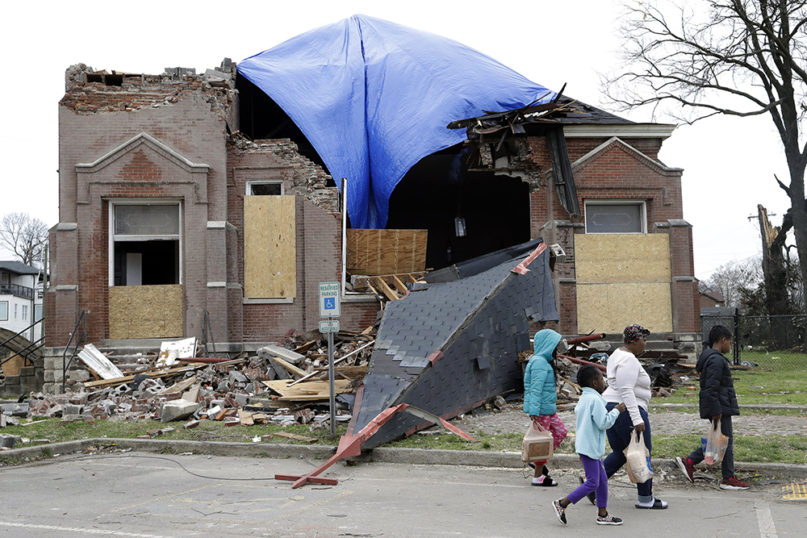(RNS) — In a matter of minutes last week (March 3), our lives in Nashville and other parts of middle Tennessee were changed when an F3-level tornado hit, causing at least 22 deaths and leaving at least 330,000 people without electricity. While the national media has written a few stories about the devastation, the news of Super Tuesday and coronavirus has distracted most news outlets from the magnitude of what we are dealing with.
But amid the shock, grief, loss and pain, our city is doing what I call activist theology. In the hardest-hit areas of East and North Nashville, Donelson, Hermitage, Mt. Juliet, Lebanon and Cookeville, people are leaning into community, donating time, skills, money and whatever else is needed to begin rebuilding. Folks are coming together to get their hands dirty.
As womanism teaches us, together we are making a way out of no way!
As one of those most visible in responding to this crisis in our city, I’ve been dubbed the “tornado chaplain.” I am grateful to be providing pastoral care in a time like this, but it’s not a title I ever aspired to. Other groups have been remarkable in leading critical efforts to recover and rebuild. Gideon’s Army, a black-led “boots on the ground” service organization, is working directly with our neighbors in North Nashville, one of the historically black neighborhoods that was hit hard and, because of institutional racism, faces a struggle to get access to services.
In 2010, a historic flood displaced black and brown people, many living in poverty, from East Nashville to North Nashville. Those parts of Nashville were quickly gentrified. Developers were sweeping in like vultures, and the result was more displacement of black and brown people and the sky-rocketed rent prices fewer and fewer can afford. Many of us are working hard to create conditions in which this isn’t repeated. It is our spiritual duty to not let this happen again.
Yet the same day that the tornado hit, there were reports from residents of predatory developers driving around in Land Rovers, surveying properties and making cash offers to those whose homes were destroyed that significantly undervalued their property.
“There has been a gentrification tornado spinning through North Nashville for the last 10 years,” the Rev. Jeff Obafemi Carr, a local activist who ran for mayor, told The New York Times last week.
The response to this disaster has been enormous, and we are grateful for all the help and resources that are accumulating. The outpouring of love in the form of tangible resources has shown us all that we’ve done some good work here in Nashville to care for our neighbors. We just continue to give and rebuild together, creating conditions for a stronger city that is revolutionary in loving our neighbors.
(If you are looking for ways to donate time and resources, please check out Hands on Nashville, Catholic Charities’ McGruder Family Center, and the North Nashville YMCA.)
But as people’s electricity is restored and the disaster recedes into memory, we need to keep asking where the bulk of the help and money is going: to restore already gentrified communities, like East Nashville; to rural people who lost everything; or to North Nashville, where people don’t have access to generous insurance payouts and other such resources?
We cannot and will not let the tornado of 2020 be another force of gentrification.
(The Rev. Robyn Henderson-Espinoza is the founder of the Activist Theology Project, a public theology & justice inspired collaboration based in Nashville, Tennessee. The views expressed in this commentary do not necessarily reflect those of Religion News Service.)





